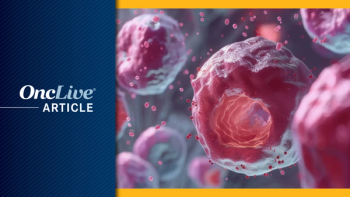
EGFR TKI–Based Combos Could Lead to More Tailored First-Line Treatment Options in EGFR-Mutated NSCLC
Leveraging EGFR TKIs as a backbone for combination therapies will be pivotal for expanding treatment options and delivering more personalized therapies in the first-line setting for patients with non–small cell lung cancer harboring EGFR mutations.
Leveraging EGFR TKIs as a backbone for combination therapies will be pivotal for expanding treatment options and delivering more personalized therapies in the first-line setting for patients with non–small cell lung cancer (NSCLC) harboring EGFR mutations, according to Marina Garassino, MD.
Single-agent osimertinib (Tagrisso) remains the standard of care for patients with EGFR exon 19 and 21 mutations after data from clinical trials showed the EGFR TKI improved progression-free survival (PFS) and penetrated the central nervous system. However, combinations under investigation could further shift the treatment paradigm, Garassino noted.
“In the future, we have to tailor our treatments based on different types of mutations, the presence of comutations, and the clearance of DNA. There is a lot of work [being done] for this research,” said Garassino, a professor of medicine, hematology and oncology, in the Department of Medicine at The University of Chicago.
In April 2018,
The approval was based on data from the phase 3 FLAURA trial (NCT02296125) in which osimertinib elicited a median PFS 18.9 months (95% CI, 15.2-21.4), vs 10.2 months (95% CI, 9.6-11.1) for standard TKI therapy with erlotinib (Tarceva) or gefitinib (Iressa; HR, 0.46; 95% CI, 0.37-0.57; P < .001).3 “There were no subgroups that did not benefit from treatment with osimertinib,” Garassino said.
Additional data showed the median overall survival (OS) with osimertinib was 38.6 months (95% CI, 34.5-41.8), compared with 31.8 months (95% CI, 26.6-36.0) in the comparator arm (HR, 0.80; 95.05% CI, 0.64-1.00; P = .046).4
Beyond osimertinib, other third-generation EGFR TKIs have displayed single-agent efficacy as a first-line treatment, Garassino explained. Aumolertinib was evaluated vs gefitinib in the phase 3 AENEAS trial (NCT03849768) for the treatment of patients with NSCLC harboring EGFR exon 19 deletions or L858R mutations. Patients in the aumolertinib arm achieved a median PFS of 19.3 months (95% CI, 17.8-20.8) compared with 9.9 months (95% CI, 8.3-12.8) for those in the gefitinib arm (HR, 0.46; 95% CI, 0.36-0.60; log-rank P < .0001).5
“One [question] is if you can use third-generation TKIs [such as aumolertinib] as [we use] osimertinib, or if we need to have head-to-head comparisons, in particular [among] these drugs developed in Asian countries,” Garassino noted.
EGFR TKI and Anti-VEGF Combinations
Preclinical data suggest dual blockade of the EGFR and VEGF pathways could be synergistic. Though past trials have demonstrated improvements in PFS with the use of first-generation EGFR TKIs plus VEGF inhibitors compared with various single-agent treatments, these trials failed to demonstrate clinical benefits in OS, Garassino explained.
Recent studies involving the combination of EGFR TKI and VEGF inhibitor combinations include the phase 3 RELAY trial (NCT02411448), where erlotinib (Tarceva), a first-generation EGFR TKI, was evaluated in combination with the VEGF inhibitor ramucirumab (Cyramza) or placebo. Regarding the primary end point, the median PFS was 19.4 months (95% CI, 15.4-21.6) with the combination compared with 12.4 months (95% CI, 11.0-13.5) with erlotinib and placebo (HR, 0.591; 95% CI, 0.461-0.760; P < .0001).6 Garassino said the OS data are not yet mature.
Other studies are exploring the combination of EGFR TKIs and VEGF inhibitors, including a phase 3 trial (NCT02824458) evaluating the gefitinib with or without the VEGFR2 inhibitor apatinib (Rivoceranib).7
The Rationale Behind Combining EGFR TKIs With Chemotherapy
Approximately 20%-30% of patients with EGFR-mutated NSCLC do not survive to receive a second-line therapy, which has prompted investigators to examine the addition of chemotherapy to an EGFR TKI in the first-line setting.
“With the chemotherapy, potentially, we can address the cancer heterogeneity. We can kill the subclones that are resistant to the EGFR TKIs,” Garassino said.
The phase 3 NEJ009 trial (UMIN000006340) and a phase 3 clinical trial in India (CTRI/2016/08/007149) both evaluated gefitinib alone vs gefitinib in combination with carboplatin and pemetrexed in patients with EGFR-mutated NSCLC.
In NEJ009, the median OS with the combination was 52.2 months (95% CI, 44.0–not estimable), compared with 38.8 months (95% CI, 31.1-50.8) for gefitinib alone (HR, 0.695; 95% CI, 0.52-0.93).8 In data from the second study published by Noronha et al, the median OS was not reached (NR) with the combination vs 17 months with gefitinib alone (HR, 0.45; 95% CI, 0.31-0.65; P < .001).9
The phase 3 FLAURA2 trial (NCT04035486) will further evaluate the addition of chemotherapy for this patient population. Patients will be randomized to receive osimertinib with or without pemetrexed and cisplatin or carboplatin following a safety run-in evaluating osimertinib in combination with the 2 chemotherapy regimens.10
“The future will be to address who are the patients [who] are the best candidates for [chemotherapy] combination therapy compared with those who are just candidates for [EGFR TKI] monotherapy, which clearly is the best [option] for the quality of life for our patients,” Garassino said.
Examining EGFR TKI Combinations
By combining first- and third-generation EGFR TKIs, clinicians could potentially exploit the different affinity of the 2 agent classes to address the unmet need for patients with C797S mutations—one of the most common acquired mechanisms of resistance to osimertinib, Garassino explained.
She added that several trials are ongoing to assess this strategy, such as a phase 2 trial (NCT03292133), which evaluating gefitinib plus nazartinib (EGF816) in newly diagnosed patients with EGFR-mutated NSCLC.11
Additionally, the combination of osimertinib plus gefitinib is being investigated in multiple studies, including a phase 1/2 trial (NCT03122717). Findings from this single-arm trial showed that patients treated with the combination (n = 27) had an overall response rate (ORR) of 88.9% (95% CI, 71.9%-96.1%) with a disease-control rate of 100%. Notably, all responders had a partial response.12
Amivantamab-vmjw (Rybrevant) plus lazertinib (Leclaza) demonstrated activity following resistance to a first-generation EGFR TKI in the phase 1 CHRYSALIS trial (NCT02609776).13 Among 45 patients who received the combination the ORR was of 36% (95% CI, 22%-51%) with a median duration of response of 9.6 months (95% CI, 5.3-NR) and 69% of responders had a response lasting at least 6 months. The median PFS was 4.9 months (95% CI, 3.7-9.5).
The combination of amivantamab/lazertinib is now being evaluated against the combination of osimertinib/lazertinib in the phase 3 MARIPOSA trial (NCT04487080).
“In the future, we will have to decide if we need a combination therapy or an EGFR TKI alone. There are many potential opportunities for research,” Garassino said. She concluded by noting that investigators are looking at driver mutation status, co-occurring mutations, and early plasma clearance.
References
- Garassino M. First-line treatment: osimertinib monotherapy versus combinations. Presented at: 23rd Annual International Lung Cancer Congress®; July 27-29, 2022; Huntington Beach, CA.
- FDA approves osimertinib for first-line treatment of metastatic NSCLC with most common EGFR mutations. News release. FDA. April 18, 2018. Accessed July 29, 2022.
https://bit.ly/3JdqPvY - Ramalingam SS, Reungwetwattana T, Chewaskulyong B, et al. Osimertinib vs standard of care (SoC) EGFR-TKI as first-line therapy in patients (pts) with EGFRm advanced NSCLC: FLAURA. Ann Oncol. 2017;28(suppl 5):V635. doi:10.1093/annonc/mdx440.050
- Ramalingaim SS, Vansteenkiste J, Planchard D, et al; FLAURA Investigators. Overall survival with osimertinib in untreated, EGFR-mutated advanced NSCLC. N Engl J Med. 2020;382(1):41-50. doi:10.1056/NEJMoa1913662
- Lu S et al. AENEAS: A randomized phase III trial of aumolertinib versus gefitinib as first-line therapy for locally advanced or metastatic non–small-cell lung cancer with EGFR exon 19 deletion or L858R mutations. J Clin Oncol. Published online May 17, 2022. doi:10.1200/JCO.21.02641
- Nakagawa K, Garon EB, Seto T, et al. RELAY: a multinational, double-blind, randomized phase 3 study of erlotinib (ERL) in combination with ramucirumab (RAM) or placebo (PL) in previously untreated patients with epidermal growth factor receptor mutation-positive (EGFRm) metastatic non-small cell lung cancer (NSCLC). J Clin Oncol. 2019;37 (suppl 15):9000. doi:10.1200/JCO.2019.37.15_suppl.9000
- A study of gefitinib with or without apatinib in patients with advanced on-squamous non-small-cell lung cancer harboring EGFR mutations. ClinicalTrials.gov. Updated July 7, 2016. Accessed July 29, 2022.
https://clinicaltrials.gov/ct2/show/NCT02824458 - Nakamura A, Inoue A, Morita S, et al. Phase III study comparing gefitinib monotherapy (G) to combination therapy with gefitinib, carboplatin, and pemetrexed (GCP) for untreated patients (pts) with advanced non-small cell lung cancer (NSCLC) with EGFR mutations (NEJ009). J Clin Oncol. 2018;36(suppl 15):9005. doi:10.1200/JCO.2018.36.15_suppl.9005
- Noronha V, Patil VM, Joshi A, et al. Gefitinib versus gefitinib plus pemetrexed and carboplatin chemotherapy in EGFR-mutated lung cancer. J Clin Oncol. 2020;38(2):124-136. doi:10.1200/JCO.19.01154
- A study of osimertinib with or without chemotherapy as 1st line treatment in patients with mutated epidermal growth factor receptor non-small cell lung cancer (FLAURA2). ClinicalTrials.gov. Updated July 13, 2022. Accessed July 29, 2022.
https://www.clinicaltrials.gov/ct2/show/NCT04035486 - A study of EGF816 and gefitinib in TKI-naïve EGFR-mutant non-small cell lung cancer. ClinicalTrials.gov. Updated January 24, 2022. Accessed July 29, 2022.
https://clinicaltrials.gov/ct2/show/NCT03292133 - Rotow JK, Costa DB, Paweletz CP, et al. Concurrent osimertinib plus gefitinib for first-line treatment of EGFR-mutated non-small cell lung cancer (NSCLC). J Clin Oncol. 2020;38(suppl 15):9507. doi:10.1200/JCO.2020.38.15_suppl.9507
- Bauml J, Cho BC, Park K, et al. Amivantamab in combination with lazertinib for the treatment of osimertinib-relapsed, chemotherapy-naïve EGFR mutant (EGFRm) non-small cell lung cancer (NSCLC) and potential biomarkers for response. J Clin Oncol. 2021;39(suppl 15):9006. doi:10.1200/JCO.2021.39.15_suppl.9006



































